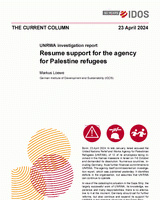UNRWA investigation report
Resume support for the agency for Palestine refugees
Loewe, MarkusThe Current Column (2024)
Bonn: German Institute of Development and Sustainability (IDOS), The Current Column of 23 April 2024
Bonn, 23 April 2024. In late January, Israel accused the United Nations Relief and Works Agency for Palestinian Refugees (UNRWA), of 12 of its employees being involved in the Hamas massacre in Israel on 7-9 October and demanded its dissolution. Numerous countries, including Germany, froze further financial commitments to UNRWA. The agency itself commissioned an investigation report, which was published yesterday. It identifies deficits in the organisation, but assumes that UNRWA can continue to operate.
In view of the catastrophic situation in the Gaza Strip, the largely successful work of UNRWA, its knowledge, experience and many responsibilities, there is no alternative to it at the moment. Germany should call for further reforms, but also continue and expand its support for UNRWA in the interests of people in the Gaza Strip.
UNRWA was established in 1949 to provide relief to Palestinians who fled or were displaced from Israel to Gaza, the West Bank, today's Jordan, Syria and Lebanon. The organisation has no fixed budget but depends always on new financial pledges. In 2022, it spent more than a billion US dollars, of which the United States financed 33%, Germany 19% and the European Commission 11%.
Without UNRWA, the humanitarian situation in the Gaza Strip would have collapsed long ago. There alone, almost 300,000 pupils attended one of UNRWA’s 183 schools in 2022, UNRWA operated 22 hospitals and health care centres and seven women’s and community centres, and it provided micro credits to 130,000 people and social assistance to 100,000 people. To this end, UNRWA employed 13,000 people in the Gaza Strip (30,000 in total).
The very fact that UNRWA had to provide the majority of social services in the Gaza Strip even before the war proves that Hamas has not lived up to its responsibility to govern there. On the other hand, it would also not have been able to finance the care of the almost two million inhabitants from its low income without external support. The small area barely allows for agriculture, water and energy are scarce, and foreign trade was cut off by Israel.
During the war, UNRWA became even more important. No other organisation has as many employees in the Gaza Strip, knows the situation as well and has comparable logistics and experience as UNRWA, which has been the essential backbone and organiser of the distribution of humanitarian aid from the very beginning of the war.
Also, no organisation will be able to take over UNRWA's tasks in the foreseeable future. All actors should therefore have an interest in UNRWA continuing its work and thereby preventing the humanitarian catastrophe from becoming even worse. Anyhow, many aid organisations have been withdrawing from the Gaza Strip since Israel fired on a convoy of the non-governmental organisation World Central Kitchen in early April, thereby killing seven people.
In January, Israel claimed that twelve UNRWA employees had been involved in the Hamas massacre in Israel on 7-9 October, in which at least 1139 people had been killed, 5400 injured and 240 kidnapped, and that as many as 10% of UNRWA employees in the Gaza Strip had links to militant Islamist groups. No evidence of these allegations have been published so far. Also, it is striking that Israel made these allegations only three and a half months after the Hamas massacre – but on the very day after the International Court of Justice called it to refrain from genocide and to ease humanitarian assistance in the Gaza Strip. Still, some of the accusations are likely true: The New York Times reported evidence that at least three UNRWA employees had participated in kidnappings and three others had stockpiled or brought ammunition to the massacre. UNRWA immediately dismissed these individuals.
Even with the best controls, UNRWA probably could not completely prevent terrorists from being among its 13,000 employees in the Gaza Strip or becoming terrorists over time. Even Israel, which regularly receives a list of all UNRWA employees, had apparently not noticed this before. It should be borne in mind that an organisation has been ruling the Gaza Strip for 18 years that attempts to comprehensively control and indoctrinate all inhabitants. UNRWA must improve its control mechanisms, but it should not be abandoned altogether.
At the end of January, the German government announced that it would not make any new funding commitments for UNRWA in Gaza until the Israeli allegations had been clarified. The USA, the UK, Japan and Austria took similar decisions, while others, such as France and Norway, continued their support, and Spain, Portugal and Ireland even increased their pledges. On 25 March, Germany pledged an additional 45 million euros to UNRWA – but only for its work in Jordan, Syria, Lebanon and the West Bank.
However, Germany should also approve new funds for Gaza and expand further its support for UNRWA. Japan, Australia and Canada have already done so. UNRWA is almost the last thing people in Gaza have left, and reconstruction will urgently require its structures and experience. Who else is going to provide social services in Gaza in the future? Hamas is not meant to return to government; other Arab countries will not want to get actively involved, and Israel will not want to take over responsibility for the civil administration in Gaza again either. The report of the independent investigators, which was presented the day before yesterday, also concludes that UNRWA should further improve its control mechanisms but continue its work.

